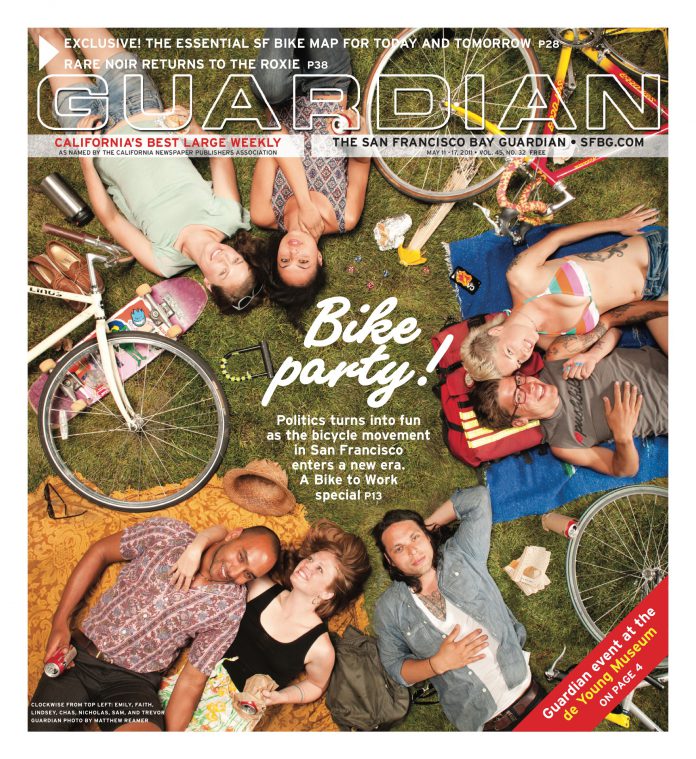arts@sfbg.com
Compilations often serve two purposes, sometimes at the same time: they can be brief introductions or exhaustive overviews. The San Francisco label Dark Entries just released BART: Bay Area Retrograde, a collection of local, underground music from the early ’80s, which feels like a bit of both. Representing local bands — from Danville to Palo Alto, Berkeley, and SF — that gravitated toward an alienated, synth-driven sound, it’s a meticulously curated snapshot that feels complete in itself, but is also a primer for the minimal synth revival. With many songs verging on 30 years old, label owner and DJ Josh Cheon and co-curator Phil Maier have compiled tracks that were un- or little- known in their own time but now sound very much of the moment.
There are many names for the variety of styles represented across BART‘s 11 songs — synthpop, post-punk, and cold, minimal, or new wave are only the most common. But nearly half of the songs are complete obscurities — four are previously unreleased and two appeared only in small, self-released editions — and the compilation as a whole is difficult to pin down. These are artifacts from a lost era, our local contribution to an international group of artists who created music that was bound to be marginal, faced with intense rock chauvinism and Reagan-era optimism.
BART kicks off with three songs (Nominal State’s “Middle Class,” Batang Frisco’s “Power,” and Necropolis of Love’s “Talk”) that sound like a blueprint for the current renaissance of icy analog futurism by groups like Xeno and Oaklander, Staccato du Mal, and The Soft Moon. But curveballs like Wasp Women’s No-Wave-y “Kill Me” and The Units’ peppy ode “Mission” alleviate the future-shock claustrophobia and put the compilation in a category of its own — it’s as much a love letter to the Bay Area’s taste for the goofy and willfully weird as an archival release.
There’s a sense of playfulness that’s immediately apparent in the presentation. Eloise Leigh’s eye-popping jacket design is satisfyingly heavy on pink, blue, and yellow, and comes as a six-panel fold-out poster rather than a standard cardboard pocket, suggesting it would prefer wall space rather than a slot on the shelf. Comprising liner notes from the Guardian’s Johnny Ray Huston and band data on one side and Dr. Art Nuko’s painting Getting Bombed in San Francisco on the other, BART the consumer object feels like something that belongs nowhere so much as Valencia Street’s overflowing vintage zine store, Goteblüd. And while the music contained on the vinyl within can be dark and brooding like “Talk,” or abrasive and fractured like Standard of Living’s “N.F.A.,” the most memorable songs, to me, are the frothy ones: Danny Boy and the Serious Party Gods’ parody-of-a-parody “Castro Boy,” and the above-mentioned “Mission.” The former riffs on Zappa’s “Valley Girl,” but ups the raunch with ad-libs about fisting, while “Mission” builds up to its irrepressible chorus with verses celebrating the unassailable pleasures of being high and eating burritos. Even if you aren’t already a minimal synth nerd, BART is a fun album.
With its variety of styles and lyrical themes, BART holds together not only because there’s a high baseline of quality, but also because of the built-in context. In addition to the design, a lot of work clearly went into finding and collaborating with these long-defunct bands, from securing unheard demos to listing the synth models used for each track. It’s a meticulously assembled record, a guided experience that points out what is so unsatisfying about downloading some lost classic from a sharity blog and deleting it, unlistened to, months later. Its local focus also sets it apart from the compilations that helped define minimal wave, although it contributes to that canon as well.
As the underbelly of an underground dominated in the retelling by figures like Chrome, Flipper, and The Residents, BART‘s new audience lives in a skewed world, where technology provides us with nearly endless opportunities to connect, where analog synths are revered for their warmth and character, and where the Mission is gentrified. Yet faced with an excess of information every time we make a decision, the rough edges of this serious, cynical music offer opportunities to disconnect from the endless demands of the present. The past will always have the advantage of seeming coherent, but BART‘s biggest success is in the way it captures the innovative, corrosive energy of its time. * *

